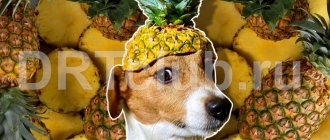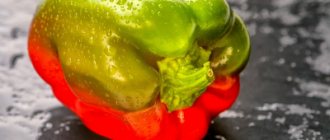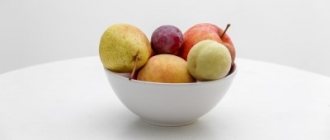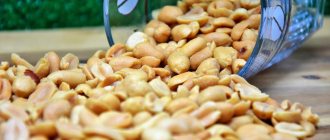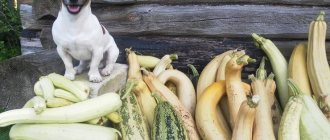When talking about the diet for dogs, many owners have in mind, first of all, meat and cereals - the basis of the dog’s “menu”. However, we should not forget that, in addition to protein, the animal needs fiber and vitamins.
This means that the dog’s diet should also include plant foods – in particular, vegetables. What vegetables are the most beneficial for dogs' health?
List of useful
Dogs digest most types of vegetables perfectly (with rare exceptions). So, you can safely include in your animal’s diet:
- cucumbers;
- tomatoes;
- zucchini;
- white cabbage;
- pumpkin;
- carrot;
- beets;
- corn;
- eggplant;
- bell pepper
Most vegetables can be given to dogs raw, after cutting them into small pieces, but many dogs will not mind boiled pumpkin or zucchini.
Important: Eggplants, tomatoes and beets should be given with caution and in small portions - these vegetables can cause an allergic reaction in some dogs.
Features of feeding plant foods
In order not to harm the pet, this type of product should be administered in small portions. If it is not suitable, then the dog will soon show allergies or other adverse symptoms.
Every time you give new fruits or berries, it is necessary to monitor the dog’s condition. It is unknown how her body will react to an unusual product. Consequences that require immediate medical attention:
- allergies: discharge from the eyes and nose;
- redness of the mucous membrane, tips of the paws;
- hair loss;
- breathing problems;
- rash in the form of flat blisters, pimples;
- swelling of the neck, muzzle;
- peeling of the skin;
- increased gas formation;
It is better to feed dogs vegetables and fruits that are in season, thus avoiding poisoning from chemicals that are used to process plant foods and accelerate ripening. Also, you should not treat them to overripe or rotten plant products.
You should not give dogs fermented milk food and fruit on the same day, as this can cause gastrointestinal diseases. And if your pet has chronic problems in this area, you should consult a veterinarian before feeding him plant foods.
Which ones should you not feed?
Some types of vegetables are strictly contraindicated for dogs. Even if your pet begs for them as a treat with all his might, you should not indulge him, as this is a significant risk to his health. “Undesirable” vegetables include the following.
Onions of all types - onions, leeks, green: all of these plants contain substances that can cause degeneration of red blood cells in a dog and, as a result, hemolytic anemia.
In addition, onions contain a substance called thiosulfate, which the animal's stomach is not able to digest due to the lack of necessary enzymes. The accumulation of thiosulfate in the body can lead to poisoning - without death, but with very serious consequences.
Garlic – For the same reasons as onions, although garlic is somewhat less toxic.
Potatoes, especially raw ones, contain solanine, an extremely dangerous toxin for dogs that can be fatal in large quantities.
In boiled potatoes, the level of solanine is much lower, and, in principle, it can be given to a dog as a treat - but very rarely, since due to the high starch content, potatoes are practically not absorbed by the dog’s body and often cause constipation.
Rutabaga - consuming this vegetable in large quantities can cause the dog to develop hypothyroidism - thyroid dysfunction.
Artichokes – they do not pose a serious danger, but are poorly digested by the dog’s body and can cause stomach upset.
In addition, it is not advisable to give dogs legumes of any kind - peas, beans, soy, and peanuts. They will not cause poisoning, but the animal’s body will not absorb them; in addition, legumes can cause flatulence.
Including greens (such as celery) in your dog's diet should be done with great caution. A dog's digestive system is not designed to digest leafy greens. In addition, large quantities of greens can provoke an allergic reaction in the animal. However, small portions of greens - about 1 teaspoon per day - will be very beneficial.
From time to time, dogs can be given mint, basil, parsley, lettuce, dill, oregano, lemon balm, rosemary.
Strictly do not give dogs onions and garlic
I try to explain to all owners that onions and garlic are dangerous for dogs. These tangy-tasting fruits contain disulfide, a sulfur compound that causes red blood cell destruction in dogs. If your pet systematically eats garlic or onions, it can cause severe anemia.
If a dog eats a lot of onions, in addition to anemia, he will receive acute poisoning. Allicin, contained in onions and garlic, reduces blood pressure and causes muscle weakness.
Poisoning and anemia may not appear immediately after eating onions, but over time, since disulfides, allicin and allisatin can accumulate in the body.
Finally, onions and garlic contain a lot of essential oils; they are caustic foods that cause irritation to the lining of the stomach and intestines.
In the literature of the 20th century, there are instructions to give dogs a clove of garlic from time to time to prevent helminthic infestation. As a veterinarian, I try to debunk the myth that garlic can rid your pet of parasites (a note about this HERE).
Most often, onion poisoning is associated with eating human food. The dog may reach the barbecue bucket, attracted by the smell of meat, and eat the pickled onions. Owners sometimes give their pets baby food (which often contains onions), leftover soup or a cutlet. Please protect your dogs from such “goodies”.
For small breeds
Small breed dogs - toy terriers, chihuahuas, Yorkshire terriers and others - need vegetables in their diet. In the menu of a small breed dog, vegetables and greens should make up at least 50%.
You should be especially careful when feeding beets, tomatoes and eggplants to small dogs, as small breeds are more likely to develop allergies.
It is also undesirable to give cabbage to small dogs, even in boiled form - it can cause digestive problems.
For large
Large dogs need protein food more, so the proportion of vegetables in their diet should be less - on average it is about 20-30%. Also, large breeds are more resistant to the effects of allergens and toxins, so they can be given vegetables from the “risk group” (tomatoes, eggplants, beets) with less fear.
Toxins from onions and potatoes affect their body more slowly - so if your dog accidentally eats a slice of onion or a piece of potato, you don’t have to sound the alarm, but wait until the toxic substances are processed by the dog’s body.
Can I eat the peel and seeds?
The melon has traveled a long way before getting to the owners’ table. The surface of the product’s peel is porous, capable of absorbing dirt, the smallest microelements, toxic and other substances. It is impossible to predict what the dog’s body will react to eating the crust. But there is no benefit from the crust. The internal contents (except for the pulp), as well as the seeds, are also not suitable. The best solution is to remove them and clean the fruit. In general, the procedure for feeding a dog should be as follows:
- wash the outside of the fruit thoroughly;
- cut into small pieces (2-3 cm), without peel;
- Give the dog only one pulp.
The fruit itself should be ripe and soft.
For puppies
Puppies of any breed benefit from vegetable complementary foods in the form of carrots, cucumbers, pumpkins, crushed to a puree. Teenage puppies can be given boiled vegetables in pieces.
It should be remembered that the older the dog, the more protein should be in its diet, therefore, once the puppy reaches adolescence, vegetables must be gradually replaced with meat (of course, not completely eliminating them, but bringing their amount to the “adult” norm).
In what form - raw or cooked?
Cucumbers, tomatoes, zucchini and carrots can be given raw, after cutting them into pieces. Dogs of large breeds can be given carrots to chew whole from time to time - this will help the dog clean his teeth. For the same purposes, you can give your dog unsalted tomato juice.
It is better to boil pumpkin, eggplants, and beets first - this way these vegetables will be better absorbed by the animal’s body.
Corn should be given exclusively fresh - in no case canned in jars; the dog simply cannot digest corn in this form.
For better digestibility, it is recommended to combine carrots with fats - for example, mix with cottage cheese or sprinkle with vegetable oil. An excellent option (especially for large breeds) would be special “dog salads” made from carrots, bell peppers and cucumbers or tomatoes, seasoned with vegetable oil.
Cabbage must first be stewed or boiled - in its raw form it is not digestible by dogs, and in small breeds it can cause serious stomach problems.
Finely chopped vegetables - carrots, turnips, boiled pumpkin - can be added to dogs' porridge.
Dangerous sweets
Most children and adults' favorite treats are all kinds of sweets and confectionery. Even your four-legged pet will not refuse these treats. Many dogs enjoy eating pastries, sweets and cakes, and do not refuse sweet soda. These products are dangerous for animals and can cause a lot of harm.
Just like in humans, eating sweets disrupts the acid-base balance in dogs. But for animals this violation is more dangerous. A person can rinse his mouth, brush his teeth, restore balance. The dog does not have such an opportunity. Eating sweet foods leads to increased proliferation of carious bacteria and damage to teeth.
The dog’s body is not designed for such food, it is poorly digested, glucose levels increase, and metabolic processes are disrupted. Regular consumption of desserts will certainly lead to an increase in fat mass, disruptions in the functioning of the gastrointestinal tract, and diabetes.
One of the main enemies of dogs is chocolate. It contains large amounts of theobromine. This substance causes seizures in dogs and disrupts heart rhythm. Intoxication and even death cannot be ruled out.
What to do if you vomit?
Even if the animal does not consume frankly harmful foods, such as potatoes or onions, certain types of vegetables can make him sick - vomiting, diarrhea or constipation, and sometimes problems with the pancreas develop.
The reason for such reactions is individual intolerance to a certain product. In such a situation, you should simply exclude the vegetable that caused such a reaction from the animal’s diet.
Allergy
Most often, allergies in dogs develop to red vegetables - tomatoes, beets, sometimes bell peppers, as well as eggplants. Unfortunately, it is impossible to predict in advance the allergenicity of a particular product - this can only be determined in practice.
However, it is worth remembering that small dogs are much more likely to develop allergies than large ones, so when developing a diet for them it is better to be on the safe side.
Are they needed in the diet?
The need for vegetables in a dog’s diet may come as a surprise - it is known that this animal is a predator by nature, from which some conclude that the dog should eat exclusively meat.
However, this point of view is far from the truth - even wolves in the wild do not disdain berries and herbs, and for domestic dogs, plant foods are an irreplaceable source of vitamins and fiber.
The animal's diet must be balanced - and an exclusively meat diet creates a considerable load on the liver and kidneys, so it must be diluted with lighter foods. Therefore, when planning a diet for your pet, you should not underestimate the role of plant foods in it.
Effect on the body
Let's now see how melons affect the functioning of internal organs. Based on this, it will be possible to decide whether the dog can be given melon. Regular consumption of this berry normalizes the nervous system. If you have a long journey ahead, offer your pet a piece of melon. In addition, the potassium contained in the composition supports the cardiovascular system and helps remove cholesterol.
But that is not all. If your pet suffers from constipation, then melon will be of great help to your dog. It enhances bowel function and produces a mild laxative effect. Veterinarians note the considerable benefits of melon in the treatment of kidneys, due to its diuretic effect. Thanks to its fiber and low calorie content, it becomes indispensable in the treatment of obesity, which is often a consequence of apartment living. Among other things, melon helps support immunity.
